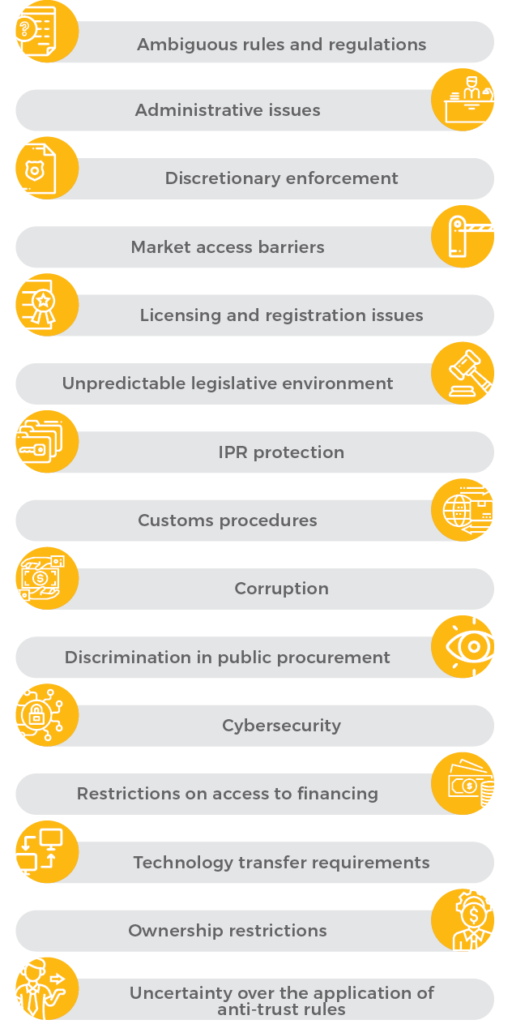
The factors complicating business for foreign firms
The World Bank released its annual Doing Business report in October, ranking economies worldwide on the ease of operating there. The top three were New Zealand, Singapore and Hong Kong. China jumped 15 places to No. 31, which also earned it a spot among the 10 economies that made the most reforms over the previous 12 months. The World Bank credited China for undertaking “substantial efforts to improve the domestic business climate for small and medium-size enterprises”. But would companies on the ground in China agree with this judgement? Orlaith Delaney, Content Manager with the European Chamber, considers this question.
Ahead of the 1st October celebrations of the People’s Republic of China’s 70th anniversary, many enterprises in Beijing found themselves subject to month-long shutdowns. For those that are just starting to get their operations running smoothly again, the ‘ease of doing business’ in China must still seem like a pipe dream.
These mandatory shutdowns are nothing new for Beijing-based companies: whenever there’s a major event like a key anniversary or a Belt and Road Forum, the production lines and even popular nightlife areas around the capital go quiet. While it’s common for cities worldwide to experience disruptions to business during celebrations of national days or holidays—such as the Christmas season in Europe—few will oblige local enterprises to close their doors for weeks at a time. Cities across China have experienced the same blanket bans as local governments strived to meet their anti-pollution targets. Another issue for firms in China, as the European Chamber has discovered from its members, is that compliant companies are targeted as often during anti-pollution drives as those that make no efforts to curb their emissions.[1]
These are just some of the obstacles to business you won’t find listed on any of the Chinese Government’s negative lists regulating foreign investment and access to the country’s free trade zones. These lists were reduced in June 2019 in a move the Global Times said showed China’s “firm determination to further open up its vast market at its own pace, and offer dividends from its economic growth to the world”.[2] The article also cited experts promising that foreign enterprises would have equal access to sectors outside those negative lists, while “noting that they are also required to comply with relevant local laws and rules”.[3]
It is these local laws and rules that often pose the most difficult barriers for foreign business in China. One example of such regulatory barriers can be seen in the following example from the blog of an ‘old China hand’, Gilbert Van Kerckhove:[4]
“Recently Chinese customs came out with a new regulation to be enforced: no any food and beverage products could be imported if they contained acesulfame potassium. It is a calorie-free sugar substitute known as E950 in the European Union.
It has been used in foods and beverages around the world for fifteen years and in numerous foods in the USA since 1988. More than ninety studies have demonstrated the safety of acesulfame potassium, also known as ‘acesulfame K’.
It is used in such products as candies, baked goods, frozen desserts, beverages, dessert mixes, tabletop sweeteners, some beers and many other food products and condiments. Unlike other sweeteners, it is stable when heated. This explains why it is found in many baked goods.
As a result, suddenly many famous fruit juices were stopped by Chinese Customs. Containers of Belgian beer were bulldozed as it was said to contain the substance; actually, the substance is a direct result from the fruit added in the beer and was not added separately.
The move was seen by many as a way to block imports of foreign products that were a threat to domestic competitors, fruit juices among others.”
The European Chamber launched its European Business in China Position Paper 2019/2020 in September. Of the 34 working groups and sub-working groups that contributed papers, all but two explicitly cited indirect barriers—such as those listed in the table below—as a concern for their industry. As a result, one of the recommendations of the Executive Position Paper to the Chinese Government was:
“Reinvigorate China’s opening up process to embrace a holistic understanding of market access that goes beyond direct barriers like the negative lists and also considers secondary barriers like licensing.”[5]
European Business in China Position Paper 2019/2020

Some of these secondary barriers cited include: hospitals required to source Chinese brand medical products;[6] foreign-invested enterprises blocked from full participation in technical committees on standards;[7] requirements for the testing of all cosmetic imports on animals;[8] requirements for security reviews for cross-border transfers of data gathered in China;[9] and the non-recognition of international professional qualifications.[10]
These are issues regularly brought up by members of the European Chamber. For instance, in our Business Confidence Survey 2019 report, over two-thirds of respondents said indirect barriers such as these were the main reasons for their restricted access to the Chinese market.
There is no doubt the Chinese Government has achieved reform
in many sectors, but work on indirect barriers to trade must accompany these
efforts. Otherwise, the Chinese capital may see an exodus of companies ahead of
the 2022 Winter Games, as they avoid mandatory shutdowns further compounding
the impact the economic slowdown and trade war are already having on their
bottom lines.
[1] Nanjing Position Paper 2019/2020, European Union Chamber of Commerce in China, 2019, p. 14.
[2] Chu, Daye and Huang, Ge, China Further Cuts Negative Investment List, Global Times, 30th June 2019, viewed 8th August 2019, <http://www.globaltimes.cn/content/1156303.shtml>
[3] Ibid.
[4] Gilbert van Kerckhove, China Foreign Investment Law, blog.strategy4china.com, 24th May 2019, viewed 1st November 2019, <https://blog.strategy4china.com/2019/05/china-foreign-investment-law/>
[5] European Business in China Position Paper 2019/2020, European Union Chamber of Commerce in China, 2019, p. 30, <https://www.europeanchamber.com.cn/en/publications-position-paper>
[6] Ibid, p. 23.
[7] Ibid, p.132.
[8] Ibid, p. 195.
[9] Ibid, p. 317.
[10] Ibid, p. 290.


Recent Comments